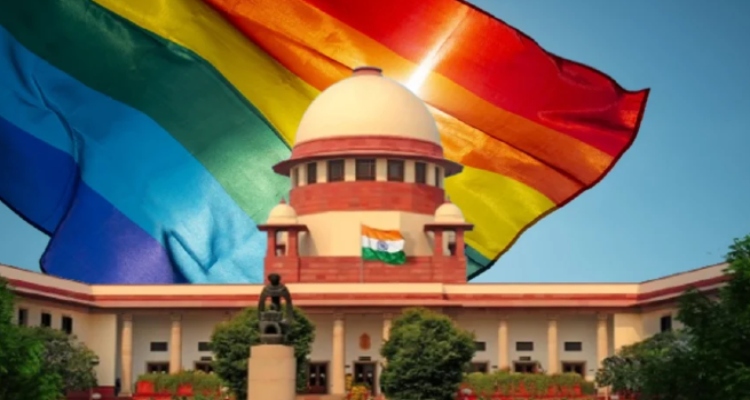
The Supreme Court will hear a batch of pleas on July 10 seeking a review of its judgement from last year, which denied legal recognition to same-sex marriage.
As per the cause list for July 10 on the apex court’s website, a constitution bench will consider the review pleas in-chamber.
As per standard practice, review pleas are considered in-chamber by five-judge benches. The five judge constitution bench will be headed by CJI DY Chandrachud. It will also include Justices Sanjiv Khanna, Hima Kohli, B V Nagarathna, and P S Narasimha.
In a setback to gay rights activists, the Supreme Court had on October 17 last year refused to accord legal recognition to same-sex marriage, stating there was “no unqualified right” to marriage except those recognized by law. However, the apex court strongly advocated for the rights of queer individuals to ensure they do not face discrimination in accessing goods and services. It also emphasized the need for safe houses known as ‘Garima Greh’ in all districts for community members facing harassment and violence, and dedicated hotline numbers for emergencies.
The court held that transgender people in heterosexual relationships have the freedom and entitlement to marry under existing statutory provisions. It also stated that legal recognition of unions similar to marriage or civil unions can only be granted through enacted law.
Constitution Bench
A five-judge constitution bench, headed by CJI Chandrachud, delivered four separate verdicts on a batch of 21 petitions seeking legal sanction for same-sex marriages. All five judges unanimously refused to accord legal recognition to same-sex marriage under the Special Marriage Act, stating it was within Parliament’s ambit to amend the law to validate such unions.
While the CJI authored a separate 247-page verdict, Justice Sanjay Kishan Kaul (since retired) penned a 17-page judgment broadly agreeing with Justice Chandrachud’s views. Justice S Ravindra Bhat (since retired), who wrote an 89-page judgment for himself and Justice Hima Kohli, disagreed with some of the CJI’s conclusions, including on the applicability of adoption rules for queer couples. Justice PS Narasimha, in his 13-page verdict, fully agreed with Justice Bhat’s reasoning and conclusions.
The judges unanimously held that queerness is a natural phenomenon and not an “urban or elite” occurrence. In his judgment, the CJI recorded an assurance by Solicitor General Tushar Mehta that the Centre would constitute a committee chaired by the Cabinet Secretary to define and elucidate the scope of entitlements for queer couples in union.
Ongoing Fight for LGBTQIA+ Rights
LGBTQIA+ rights activists, who had previously won a significant legal battle in 2018 when the Supreme Court decriminalized consensual gay sex, moved the apex court seeking validation of same-sex marriage and related reliefs such as adoption rights, enrolment as parents in schools, opening of bank accounts, and accessing succession and insurance benefits.
Some petitioners urged the apex court to use its plenary power, “prestige, and moral authority” to push society to acknowledge such unions, ensuring LGBTQIA+ individuals lead a “dignified” life comparable to heterosexuals. LGBTQIA+ stands for lesbian, gay, bisexual, transgender, queer, questioning, intersex, pansexual, two-spirit, asexual, and allied persons.




